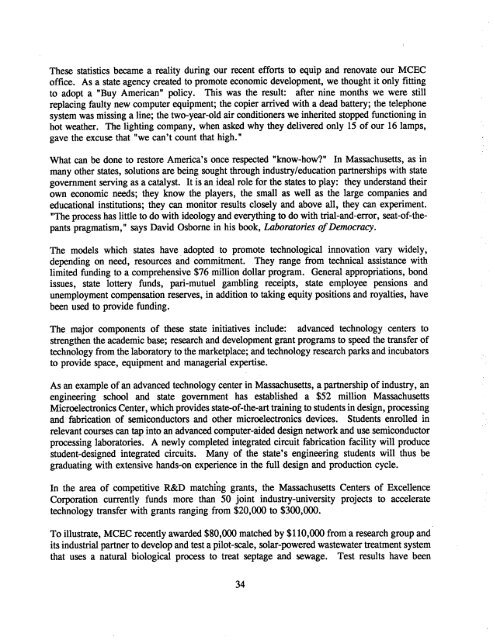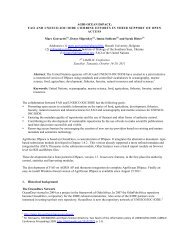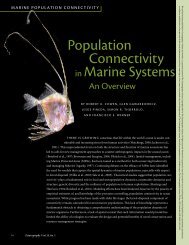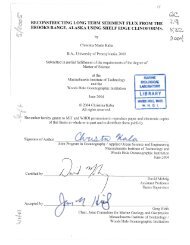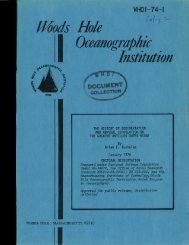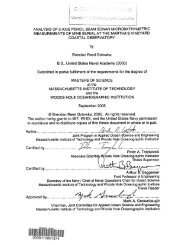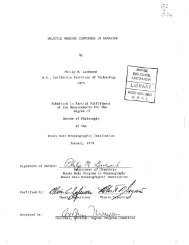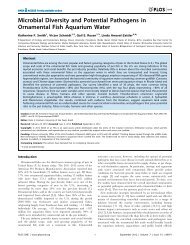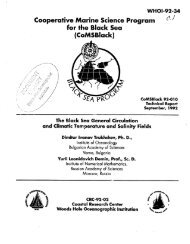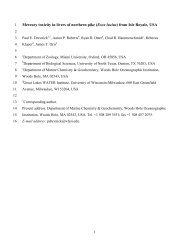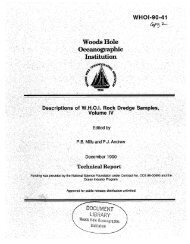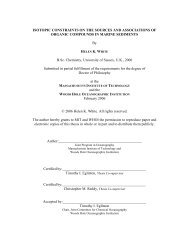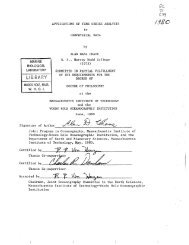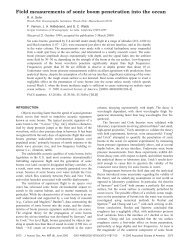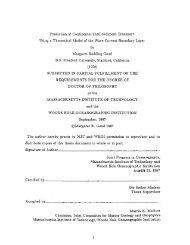WHOI-90-52
WHOI-90-52
WHOI-90-52
Create successful ePaper yourself
Turn your PDF publications into a flip-book with our unique Google optimized e-Paper software.
These statistics becme a reaity during our recnt efforts to equip and renovate our MCEC<br />
office. As a state agency created to promote economic development, we thought it only fitting<br />
to adopt a "Buy America" policy. This was the result: after nine months we were still<br />
replacing faulty new computer equipment; the copier arved with a dead battery; the telephone<br />
system was missing a line; the two-yea-old air conditioners we inherited stoppe functioning in<br />
hot weather. The lighting company, when asked why they delivered only 15 of our 16 lamps,<br />
gave the excuse that "we can't count that high."<br />
What ca be done to restore America's once respeted "know-how?" In Massachusetts, as in<br />
many other states, solutions are being sought through industr/education parerships with state<br />
government serving as a catayst. It is an idea role for the states to play: they understad their<br />
own economic nees; they know the players, the small as well as the large companies and<br />
educational institutions; they ca monitor results closely and above all, they ca experiment.<br />
"The procss has little to do with ideology and everything to do with tral-and-error, set-of-thepants<br />
pragmatism," says David Osborne in his book, Laboratories of Democracy.<br />
The models which states have. adopted to promote technologica innovation var widely,<br />
depending on nee, resources and commitment. They rage from technica assistace with<br />
limited funding to a comprehensive $76 milion dollar program. General appropriations, bond<br />
issues, state lottery funds, par-mutuel gambling receipts, state employee pensions and<br />
unemployment compensation reserves, in addition to tang equity positions and royalties, have<br />
been use to provide funding.<br />
The major components of these state initiatives include: advance technology centers to<br />
strengthen the academic base; resech and development grant programs to spe the trasfer of<br />
technology from the laboratory to the marketplace; and technology reseach parks and incubators<br />
to provide space, equipment and managerial expertse.<br />
As an example of an advance technology center in Massachusetts, a parnership of industry, an<br />
engineering school and state government has established a $<strong>52</strong> milion Massachusetts<br />
Microelectronics Center, which provides state-of-the-ar training to students in design, procssing<br />
and fabrication of semiconductors and other microelectronics devices. Students enrolled in<br />
relevant courses ca tap into an advance computer-aided design network and use semiconductor<br />
procssing laboratories. A newly complete integrated circuit fabrication facilty wil produce<br />
student-designed integrated circuits. Many of the state's engineering students wil thus be<br />
graduating with extensive hands-on experience in the full design and production cycle.<br />
In the area of competitive R&D matching grants, the Massachusetts Centers of Excellence<br />
Corpration currently funds more than 50 joint industr-university projects to accelerate<br />
technology transfer with grants raging from $20,00 to $300,00.<br />
To ilustrate, MCEC recntly awarded $80,00 matched by $110,00 from a reseach group and<br />
its industral parner to develop and test a pilot-scae, solar-powered wastewater treatment system<br />
that uses a natural biologica procss to treat septage and sewage. Test results have been<br />
34


